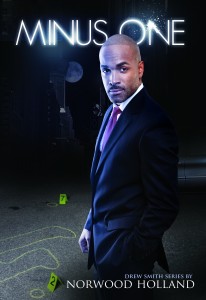A Review of Ebony the Beloved by Hannah Spivey
February 13, 2012
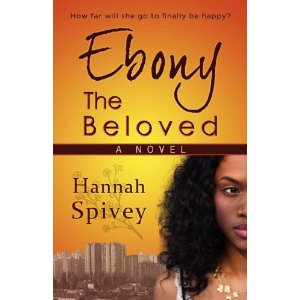 This is a story of the worst kind of childhood. Ebony while growing up in a dysfunctional household suffers physical and verbal abuse by her parents. Reduced to a pathetic creature she suffers similar abuse in school. A school official discovers her plight and rescues Ebony taking her into a caring home. One would think Ebony would be humbled and grateful finally being showered with love and attentive care. But poor Ebony can’t seem to handle her new life. Having been deprived of a healthy family relationship with low self esteem her carnal desires leads her back into trouble. It seems being deprived of the normal joys of growing up the teenager develops a fast feisty and frisky attitude. She’s wears stylish clothes, gets a perm, and discovers lipstick and jewelry. Suddenly inexperienced in life she thinks she grown.
This is a story of the worst kind of childhood. Ebony while growing up in a dysfunctional household suffers physical and verbal abuse by her parents. Reduced to a pathetic creature she suffers similar abuse in school. A school official discovers her plight and rescues Ebony taking her into a caring home. One would think Ebony would be humbled and grateful finally being showered with love and attentive care. But poor Ebony can’t seem to handle her new life. Having been deprived of a healthy family relationship with low self esteem her carnal desires leads her back into trouble. It seems being deprived of the normal joys of growing up the teenager develops a fast feisty and frisky attitude. She’s wears stylish clothes, gets a perm, and discovers lipstick and jewelry. Suddenly inexperienced in life she thinks she grown.
Ebony rejects the warming advice of her care taker and becomes involved with an older man. A wealthy pop star, Desmond is handsome and charming with a South Beach mansion. He sweeps the young girl off her feet and into his inescapable clutches. Desmond proves not to be the man she thought. Oblivious to reasons why an older man would be interested in an under age girl she believes it’s only natural because of her desirable beauty. After a series of clandestine meetings Ebony finds herself snagged in another dysfunctional relationship. Held against her will she’s reduced to a sex slave.
The story has an interesting twist at first you feel sympathy for poor Ebony, but that sympathy is quickly lost as the story advances. Initially Ebony is a victim of her circumstances of which she had no control, but when her physical appearance improves that downtrodden beaten lack of self esteem takes an about face. When Ebony is left to her own devices she becomes a victim of her own making. But there is growth, the beaten down trodden girl finally finds the wherewithal to fight back. Suddenly she reaches the tipping point transformed with a new found strength no longer willing to take the abuse she had long suffered from her parents and others.
Ebony the Beloved is an interesting read which at times forces the reader to suspend belief although stories of sex slaves and abuse are by there very nature despicable and unbelievable. At times preachy it took me awhile to grow into the story I believe because the author failed to adhere to the cardinal rule of fiction i.e. show don’t tell, nevertheless, overall the novel comes to a satisfying conclusion. 4 stars
A Review of Reasonable Facsimile by Chris Shella
January 19, 2012
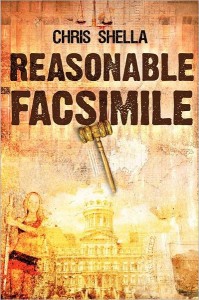 Chris Shella’s Reasonable Facsimile is a tale of woe and redemption. Jasper Davis, a.k.a. J.D.–or Jack Daniels nicknamed in honor of his favored libation– is a dynamic skilled defense attorney with lots of baggage battling demons alcohol and sex. J.D. is as dirty as the clients he represents seemingly familiar with all low life Baltimore. When court is in recess other lawyers bone up on their cases while Jack Daniels is boning up on lap dances. One wonders how he even manages to function given the excesses of his hedonistic lifestyle, but it serves to fill the void in his life, his absent wife and son. Infidelity caused his wife a college professor to kick him to the curb. There he flounders in the gutter for 7 years. He pines over the past longing to return to the days before daily habits overtook his desire to be a father and husband.
Chris Shella’s Reasonable Facsimile is a tale of woe and redemption. Jasper Davis, a.k.a. J.D.–or Jack Daniels nicknamed in honor of his favored libation– is a dynamic skilled defense attorney with lots of baggage battling demons alcohol and sex. J.D. is as dirty as the clients he represents seemingly familiar with all low life Baltimore. When court is in recess other lawyers bone up on their cases while Jack Daniels is boning up on lap dances. One wonders how he even manages to function given the excesses of his hedonistic lifestyle, but it serves to fill the void in his life, his absent wife and son. Infidelity caused his wife a college professor to kick him to the curb. There he flounders in the gutter for 7 years. He pines over the past longing to return to the days before daily habits overtook his desire to be a father and husband.
J.D. takes on a major violent first-degree murder case and finds himself challenged by the judge, the prosecutor, the witnesses, his addictions, and a sinking reputation all of which get the best of him. But a turning point comes when federal agents suspect he conspired with his client to kill the key witness, a government informant. J.D. has a come to Jesus conversion realizing its life or death and the only way to save his self is to get back home with his wife and child. To complicate it all Carmen an attorney from his past appears and wants to take on the task of salvaging his life.
Reasonable Facsimile is at times humorous and shocking. The characters seem real and familiar. Chris Shella makes effective use of the stream of consciousness technique taking the reader on a tour witnessing through Jasper’s eyes the drunken binges and hangovers, the strip joints, and courtroom drama rich with the minutia of lawyering and legal procedures.
Reasonable Facsimile is a great read despite some editorial weakness. I was disappointed expecting a legal thriller as one reviewer mistakenly touted. That sub-genre usually features an attorney or judge as the hero, caught up in a gripping courtroom drama with numerous plot twists. A legal thriller it is not, but rather a story of the redemptive self transforming suffering into a positive emotional state moving from pain and peril to redemption. Despicable Jasper Davis is transformed from the ignoble to the noble and admirable. With structural flaws Reasonable Facsimile is not a page turner. Nevertheless it is a fulfilling read. I hope for more from Attorney Shella and with the right developmental editing he should have no problem knocking a real legal thriller out of the park.
Every Writer Needs An Editor: It’s Necessary
January 13, 2012
Rec ently I was asked to review two books in final published format that clearly had not passed under an editor’s eyes. My initial reaction was embarrassment for the author while each may believe in their books–not to say the writing was bad. In fact in both books the writing was quite good, but poor plot and character development, typos, misspelled words, and misplaced commas were huge distractions taking away from the reading experience diminishing the book’s value. Why is it that some authors publish their work without an editor’s assistance? Very few if any published books are error free, but rest assured those that have been properly edited are usually free of obvious errors. This has been the dilemma of self publishing and reason why major newspapers refuse to review self published books regarding them as of poor quality and mere vanity publications. Why some authors skip this necessary step is beyond me, but I offer this advice, if you can’t afford an editor then you can’t afford to publish.
ently I was asked to review two books in final published format that clearly had not passed under an editor’s eyes. My initial reaction was embarrassment for the author while each may believe in their books–not to say the writing was bad. In fact in both books the writing was quite good, but poor plot and character development, typos, misspelled words, and misplaced commas were huge distractions taking away from the reading experience diminishing the book’s value. Why is it that some authors publish their work without an editor’s assistance? Very few if any published books are error free, but rest assured those that have been properly edited are usually free of obvious errors. This has been the dilemma of self publishing and reason why major newspapers refuse to review self published books regarding them as of poor quality and mere vanity publications. Why some authors skip this necessary step is beyond me, but I offer this advice, if you can’t afford an editor then you can’t afford to publish.
With the growth of the internet, self publishing has taken off giving the publishing cartel, the “Big Six”, (Hachette Book Group, Harper Collins, Macmillan, Penguin Group, Random House, and Simon & Schuster) a run for the book buyer’s money. These publishers hire people who do nothing but editing and regard this step as the most important in the publishing process. For good reason, good writing is so much more than just grammar and punctuation. Many authors spend years in apprenticeship mastering the skills. I’ve heard novelists boast of having no formal training and I don’t believe formal training is required but there are certain fundamental rules that must be mastered. Concepts like show don’t tell, point of view, characterization, exposition and dialogue mechanics all have rules which serve a purpose enhancing the reading experience. If you’re a writer and you don’t recognize these terms you better ask somebody. Better yet. study the craft, immerse yourself in your chosen genre. There is a plethora of books and how to sources online and in your local library. Join a writing group and attend writing conferences. You’ll be amazed with what you take away.
I wrote my first book 10 years ago and could have wall papered a room with the rejection letters. It wasn’t easy, but I didn’t give up, and began to study the genre I aspired to publish in, I subscribed to Writers’ Digest and The Writer’s Magazine which would publish one of my articles years later. I studied, I learned, I conquered. Indeed it took time and money, neither of which was prohibitive. I saw it as an investment. I continued to write but hired professional editors who guided me to next level. The rejection letters to my queries didn’t stop but something changed. Publishers began to requests the entire manuscripts rather than first 30 pages. I managed to get more than just a foot in the door but a manuscript on the desk, a benefit of attending pitch conferences. That extra added criticism and guidance helped my work shine, and you want your work to shine and to improve your chances its necessary to invest in your writing.
I learned attending writing conferences the value of blogs and social media, and to the aspiring novelist, do yourself a favor and avoid a future of having to make excuses, explanations and playing the blame game. There’s a reason professionals and academia rely on peer review. Don’t destroy your future as a writer before you even begin, invest the time and money. It’s necessary. You’re putting your name out there, and if you want readers to keep coming back give them reason to.
A Review of Strangers in the Streets by Mitch Credle
December 29, 2011
Credle takes the writer’s adage “write what you know” to heart, leading the reader on a journey into the heads and hearts of vulnerable young men born into an environment where they are groomed and nurtured in the street life. Love plays a pivotal role and a redeeming force in both their lives. A determined father succeeds in removing Smokey from the ghetto life while Black hardened by time served returns to his uncle’s drug dealing enterprise. He resumes the street life killing and robbing until he falls in love with April, a good woman. Love gives Black’s life purpose but at this point it’s too late. The master of his fate not even April’s nor Smokey’s brotherly love can save him.
Strangers in the Streets is a good read despite eschewing the standard dialog format it nevertheless flows. Few writers are able to capture the depth, breadth and reality of street life as experienced by the young African American male with its distinct language and code of conduct. Mitch Credle does it well because he’s been there growing up on the streets of D.C. and rising up to a Homicide Detective with the Metropolitan Police Department.
Strangers in the Streets is a suspenseful read with actual empathy for the villain Ricky Walker otherwise known as Black. The book leaves the reader a sense of hope. Indeed, there is hope for the young men imprisoned and those queuing up to take their place. That hope can only be manifested by changing the environmental forces that shape their lives.
It is said, men are the products of their environments, some rise above it, many do not. It’s certain by changing their bleak environment we can raise the hopes of many.
Mysticism in Latino Writing
November 20, 2011
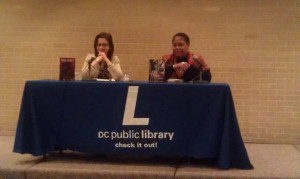
The MLK Library presented a Saturday afternoon book discussion on Mysticism in Latino Writing featuring authors Lyn Di Iori and Dahlma Llanos Figeroa. The authors discussed the role of mysticism in their novels. Lyn Di Iori’s Outside the Bones and Dahlma Llanos-Figueroa’s Daughters of the Stone are both receiving rave reviews. Iori’s Outside the Bones is an erotically charged ghost story set in both present-day New York and Puerto Rico. Praised as her brilliant debut novel it takes a mesmerizing look at issues of race, class, power and greed with Afro-Caribbean witchcraft rituals deftly woven through a sixteen year mystery unraveling a woman’s disappearance.
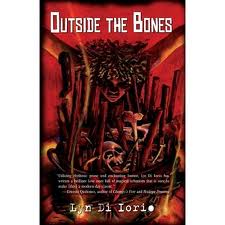 Figueroa’s Daughters of the Stone follows a sacred stone handed down five generations used to invoke mystical powers and rituals of the old ones. A rich sensual tale of mothers and daughters, love and sorrow, hardship and pride the novel through conjuring up the spirits renders a magical, deeply real, and vividly told story surrounding diasporic people.
Figueroa’s Daughters of the Stone follows a sacred stone handed down five generations used to invoke mystical powers and rituals of the old ones. A rich sensual tale of mothers and daughters, love and sorrow, hardship and pride the novel through conjuring up the spirits renders a magical, deeply real, and vividly told story surrounding diasporic people.
Both authors of Puerto Rican descent have chosen to raise the voice of the American Latina, half of the nation’s largest growing ethnicity, a segment of our culture not often heard. The powers of the Santeria, a religious practice with its African origins and Catholic influences and Puerto Rican spiritualism lie at the heart of both novels. Highly talented both authors continue a renaissance of award winning Latina writers exposing an American experience so long overlooked.
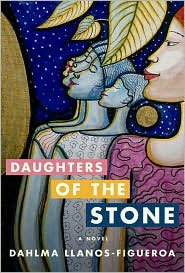
It has been said “Latina writers are powerful and seductive in their works. Their writings encompass the feelings women have in different situations, from dealing with a male-dominated society to family relationships.” No doubt the same can be said of the works of Iori and Dahlma. After readings the discussion ended with the interested patrons peppering the authors with questions about their themes, writing habits, and the Puerto Rican experience.
MLK Librarian Kathy Jenkins ended the program enthusiastically promising future similar author events. MLK Library and MahoganyBooks partnered in producing the program with the support of More Than Words (www.morethanwordsliterary.com) and Go On Girl! Book Club and Las Comadres.

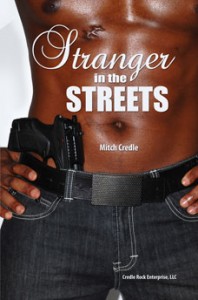 DC Homicide Detective Mitch Credle’s novel Strangers in the Street is one gritty real read, a journey into reality chocked with thugs, gangsters and rogue cops. From boys to men we follow Smokey and Black, a.k.a. Daniel Slade and Ricky Walker, one thoughtful and deliberative, the other impetuous and reckless. They bond as adolescents growing up in the rough section of Clifton Terrace spending their days hanging out, selling drugs, and committing street robberies. A crap game takes a turn for the worse and gunplay decides their future. Black takes a murder rap for Smokey and serves a juvenile life sentence. While Black is locked up until he’s twenty one, Smokey moves to the suburbs growing up in a relatively charmed existence. One becomes a hardened killer, the other a cop and years later their paths reunite and reignites their tender mutual affection. Theirs is a friendship illustrating how our past forever remains with us as constant as the loves of our lives.
DC Homicide Detective Mitch Credle’s novel Strangers in the Street is one gritty real read, a journey into reality chocked with thugs, gangsters and rogue cops. From boys to men we follow Smokey and Black, a.k.a. Daniel Slade and Ricky Walker, one thoughtful and deliberative, the other impetuous and reckless. They bond as adolescents growing up in the rough section of Clifton Terrace spending their days hanging out, selling drugs, and committing street robberies. A crap game takes a turn for the worse and gunplay decides their future. Black takes a murder rap for Smokey and serves a juvenile life sentence. While Black is locked up until he’s twenty one, Smokey moves to the suburbs growing up in a relatively charmed existence. One becomes a hardened killer, the other a cop and years later their paths reunite and reignites their tender mutual affection. Theirs is a friendship illustrating how our past forever remains with us as constant as the loves of our lives.

